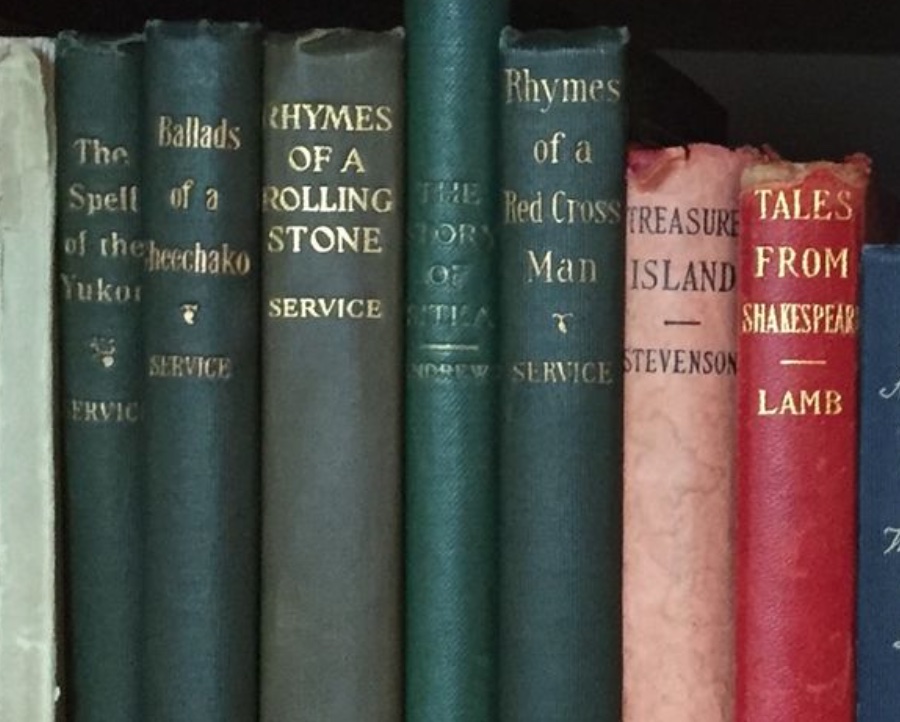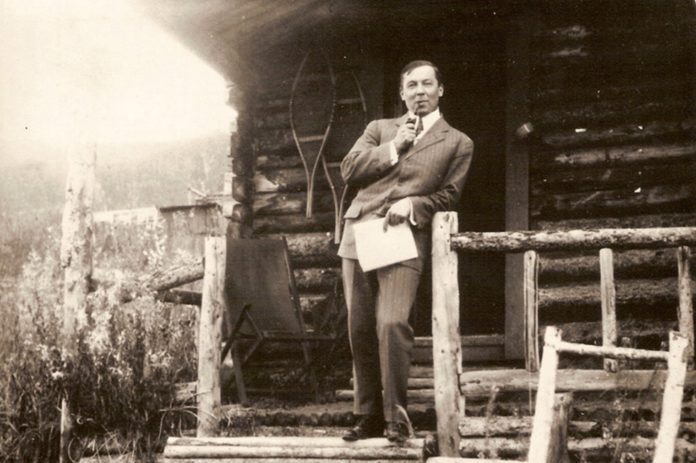Today is Gold Rush poet and writer Robert Service’s birthday. He was born Jan. 16, 1874 in Lancashire, England, the son of a bank teller and an heiress. He moved to Scotland at age five to live with his grandfather and three aunts. His parents joined him in Glasgow a few years later.
Service wrote his first poem on his sixth birthday, and while in school, he got the travel bug, and longed for adventure. After attending the University of Glasgow, he bought a fare to sail to Vancouver, B.C., and from there he headed to the Yukon Territory. It was 1894, and he was 20 years old.
More from the Poetry Foundation:
Inspired by Rudyard Kipling and Robert Louis Stevenson, Service sailed to western Canada in 1894 to become a cowboy in the Yukon Wilderness. He worked on a ranch and as a bank teller in Vancouver Island six years after the Gold Rush, gleaning material that would inform his poetry for years to come and earn him his reputation as “Bard of the Yukon.” Service traveled widely throughout his life—to Hollywood, Cuba, Alberta, Paris, Louisiana, and elsewhere—and his travels continued to fuel his writing.
Read about his life in Whitehorse, Yukon Territory, at the Whitehorse News.

A prolific writer and poet, Service published numerous collections of poetry during his lifetime, including Songs of a Sourdough or Spell of the Yukon and Other Verses (1907), which went into ten printings its first year, Ballad of a Cheechako (1909) and Ballads of a Bohemian (1921), as well as two autobiographies and six novels. Several of his novels were made into films, and he also appeared as an actor in The Spoilers, a 1942 film with Marlene Dietrich.
He was a correspondent for the Toronto Star during the Balkan Wars of 1912-13, and served in World War I as an ambulance driver in France. After the war, Service married Germaine Bougeoin and they resided mainly in the south of France until his death in 1958.
Service’s two-room cabin in the Yukon, which he lived in from November 1909 until June 1912 while writing his Gold Rush novel The Trail of Ninety-Eight (1911) and his poetry collection Rhymes of a Rolling Stone (1913), is maintained as a historic site for visitors. More at PoetryFoundation.org
The Spell of the Yukon
I wanted the gold, and I sought it;
I scrabbled and mucked like a slave.
Was it famine or scurvy—I fought it;
I hurled my youth into a grave.
I wanted the gold, and I got it—
Came out with a fortune last fall,—
Yet somehow life’s not what I thought it,
And somehow the gold isn’t all.
No! There’s the land. (Have you seen it?)
It’s the cussedest land that I know,
From the big, dizzy mountains that screen it
To the deep, deathlike valleys below.
Some say God was tired when He made it;
Some say it’s a fine land to shun;
Maybe; but there’s some as would trade it
For no land on earth—and I’m one.
You come to get rich (damned good reason);
You feel like an exile at first;
You hate it like hell for a season,
And then you are worse than the worst.
It grips you like some kinds of sinning;
It twists you from foe to a friend;
It seems it’s been since the beginning;
It seems it will be to the end.
I’ve stood in some mighty-mouthed hollow
That’s plumb-full of hush to the brim;
I’ve watched the big, husky sun wallow
In crimson and gold, and grow dim,
Till the moon set the pearly peaks gleaming,
And the stars tumbled out, neck and crop;
And I’ve thought that I surely was dreaming,
With the peace o’ the world piled on top.
The summer—no sweeter was ever;
The sunshiny woods all athrill;
The grayling aleap in the river,
The bighorn asleep on the hill.
The strong life that never knows harness;
The wilds where the caribou call;
The freshness, the freedom, the farness—
O God! how I’m stuck on it all.
The winter! the brightness that blinds you,
The white land locked tight as a drum,
The cold fear that follows and finds you,
The silence that bludgeons you dumb.
The snows that are older than history,
The woods where the weird shadows slant;
The stillness, the moonlight, the mystery,
I’ve bade ’em good-by—but I can’t.
There’s a land where the mountains are nameless,
And the rivers all run God knows where;
There are lives that are erring and aimless,
And deaths that just hang by a hair;
There are hardships that nobody reckons;
There are valleys unpeopled and still;
There’s a land—oh, it beckons and beckons,
And I want to go back—and I will.
They’re making my money diminish;
I’m sick of the taste of champagne.
Thank God! when I’m skinned to a finish
I’ll pike to the Yukon again.
I’ll fight—and you bet it’s no sham-fight;
It’s hell!—but I’ve been there before;
And it’s better than this by a damsite—
So me for the Yukon once more.
There’s gold, and it’s haunting and haunting;
It’s luring me on as of old;
Yet it isn’t the gold that I’m wanting
So much as just finding the gold.
It’s the great, big, broad land ’way up yonder,
It’s the forests where silence has lease;
It’s the beauty that thrills me with wonder,
It’s the stillness that fills me with peace.
